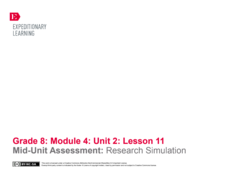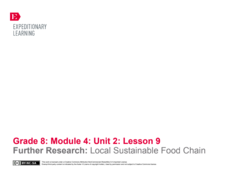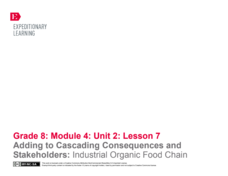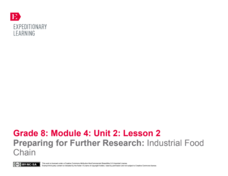American Battlefield Trust
The Home Front
Women and children played key roles during the Civil War, even if their voices are often lost in history. By studying letters and personal testimony from them, budding historians get a glimpse into the day-to-day life of civilians during...
Sargent Art
Facial Proportion Challenge: Freaky Faces
Young artists have fun making freaky faces when they accept the challenge of making proportional portraits. They must find pictures in magazines, cut out two eyes, a nose, and a mouth, and then rescale these images into a portrait.
EngageNY
Writing a Position Speech: Which Food Chain Would Be Best?
Eeny, meany, miny, moe. It's time to choose a side. Scholars learn about taking a position by watching a video of a speech about local organic food. Next, pupils use graphic organizers to plan their speeches about which food chain is...
EngageNY
Adding to Cascading Consequences and Stakeholders: Hunter-Gatherer Food Chain
Could the hunter-gatherer food chain feed everyone in the United States? To consider the question, pupils use their research and add to the Cascading Consequences chart based on Michael Pollan's hunter-gatherer food chain from The...
EngageNY
Determining Cascading Consequences Using The Omnivore’s Dilemma: Hunter-Gatherer Food Chain
Focusing on the consequences of the hunter-gatherer food chain that Michael Pollan discusses in The Omnivore's Dilemma, teams work together to create hunter-gatherer food chain consequences charts. Next, scholars view other groups'...
EngageNY
Mid-Unit Assessment: Research Simulation
As part of a mid-unit assessment, scholars complete a research simulation about food deserts to mimic the research process. Afterward, they engage in a think-pair-share to discuss what they've learned throughout the unit.
EngageNY
Adding to Cascading Consequences and Stakeholders: Local Sustainable Food Chain
Equip the class to perfect their presenting skills. To prepare for an upcoming oral presentation, scholars create and analyze an anchor chart for effective speaking skills. Pupils also use their research to add to their Cascading...
EngageNY
Further Research: Local Sustainable Food Chain
Researchers review how to create citations, find reliable sources, and paraphrase. Next, using guided task cards and their researcher's notebooks, they investigate the question they developed in instructional activity eight about the...
EngageNY
Local Sustainable Food Chain: Determining Cascading Consequences Using The Omnivore’s Dilemma
What are the consequences of the local, sustainable food chain? Research teams explore the question as they review Michael Pollan's The Omnivore's Dilemma. The teams complete Cascading Consequences charts and then choose research topics...
EngageNY
Adding to Cascading Consequences and Stakeholders: Industrial Organic Food Chain
Researchers continue determining the effects of the industrial organic food chain that Michael Pollan describes in The Omnivore's Dilemma. In teams, pupils add to their Cascading Consequences charts and complete Stakeholders charts based...
EngageNY
Using Search Terms for Further Research: Industrial Organic Food Chain
Class members conduct independent research to continue examining the consequences of the industrial organic food chain from Michael Pollan's The Omnivore's Dilemma. Pupils learn about source credibility and effective search terms, then...
EngageNY
Adding to Cascading Consequences and Stakeholders: Industrial Food Chain
Young researchers create a class Cascading Consequences chart to see how the industrial food chain affects people, animals, and the environment. They also work in teams to complete a Stakeholders chart for the industrial food chain model...
EngageNY
Preparing for Further Research: Industrial Food Chain
Using an informative resource, pupils discover how to write research questions that are focused, answerable, and relevant. Scholars evaluate resources about the industrial food chain from Michael Pollan's The Omnivore's Dilemma and then...
Council for the Curriculum, Examinations and Assessment
Managing Influences and Making Decisions
Does patience help people become more responsible? Class members explore the topic with a What's It To Do With Me? quiz to assess their personal responsibilities. They engage in a whole-class discussion about pros and cons of instant...
Sargent Art
Warhol-like Color Study
The lithographs of pop artist Andy Warhol inspire a lesson plan that asks young artists to try their hand at creating a study that demonstrates the effect color has on design. After drawing a self-portrait, participants paint their image...
American Battlefield Trust
Life at War
It looks like a cracker, but hardtack was anything but. The staple of the Civil War soldier's diet is one of many aspects of military life that scholars consider using letters from soldiers back home and images from slavery. A PowerPoint...
American Battlefield Trust
1862: Antietam and Emancipation
The Emancipation Proclamation shifted the tone and purpose of the Civil War. Using a primary source analysis, pupils consider the significance of the document. A second activity investigates the founding of the United States Colored...
EngageNY
Determining Cascading Consequences Using The Omnivore’s Dilemma: Industrial Organic Food Chain
Organic versus conventional farming: which option is best? Pupils use Michael Pollan's The Omnivore's Dilemma to determine the cascading consequences of the industrial organic food chain. They work in research teams to create an...
EngageNY
Further Research: Industrial Food Chain
Scholars extend their research of the food chain that Michael Pollan discusses in The Omnivore's Dilemma. They determine additional consequences of the food chain and add them to their Cascading Consequences charts. Additionally, pupils...
Sargent Art
Symmetry: A Design Problem
As part of a study of design, young artists examine an example of a formal (symmetrical) design and then, following step-by-step directions, create their own.
National Woman's History Museum
19th Amendment
As part of a study of the women's suffrage movement and the ratification of the Nineteenth Amendment, young historians examine documents that detail when voting rights were granted to women in various countries and when US states...
National Woman's History Museum
State vs. Federal Campaigns
Campaigns to gain voting rights for women during the 19th and 20th centuries took place on both the state and federal level. After examining primary sources that document both types of campaigns, class members debate the merits of the...
National Woman's History Museum
Seneca Falls Convention
The 1848 Seneca Falls Convention was a historic milestone in the quest for women's rights. After researching one of the participants of the Seneca Falls Convention, young historians craft and share a short presentation about their subject.
Stanford University
Captain Cook
Known as the first European to see places like Australia and New Zealand, Captain Cook led the way for the English into the world of exploration. A primary source image of Cook's firsthand account of his voyages and discussion questions...

























